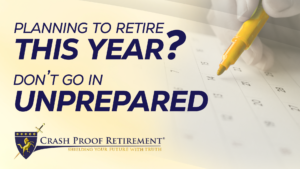The Federal Reserve’s string of interest rate hikes continued on March 22, 2023, when they raised their benchmark interest rate another 25 basis points to a target rate between 4.75% and 5%. This increase marks the ninth rate hike since March 2022. While these interest rate hikes are aimed at calming the rampant inflation that has characterized the post-COVID 19 pandemic period, high interest rates have had a far-reaching influence on the economy, creating some negative consequences for retirees, homebuyers, businesses, and more. The Crash Proof Retirement team has an analysis of these consequences to help you make the best decisions about your retirement planning.
Have Raising Interest Rates Impacted Inflation?
Inflation rates reached a 42-year high of 9.06% in June 2022, raising prices for goods and services across the board. In the six months preceding that high, U.S. Gross Domestic Product growth was slightly negative, leading some economists to compare it to the period of “stagflation” that occurred after the 1970s energy crisis.
While the current situation is similar, it doesn’t meet the strict definition of stagflation. Although inflation rates are high, unemployment rates have been relatively low and GDP growth has been positive in recent quarters. With all that said, inflation is still a big issue, and at a current rate of 6.04% it is still higher than the Fed would like it to be. While inflation is down from its heights of last year, more rate hikes may be required before it comes down to the preferred rate of 2-3%.
The Federal Reserve’s Open Market Committee, which decides benchmark interest rates, issued the following statement after their most recent meeting:
“The Committee will closely monitor incoming information and assess the implications for monetary policy. The Committee anticipates that some additional policy firming may be appropriate…”
This indicates that inflation is still too high and that interest rates could be heading even higher before the end of the year.
How Interest Rates Spurred Recent Banking Collapses
The collapses of Silicon Valley Bank (SVB) and Signature Bank earlier this month were a direct consequence of interest rate hikes. After a series of successful investments in the tech industry, SVB was flush with liquid cash, which they invested in 10-year treasury bonds. When interest rates increased, those bonds became essentially worthless. When their depositors got wind of this, it caused a bank run that left SVB unable to meet its financial obligations.
Regulators forced SVB to close, which ignited a nationwide bank run and other banks, including New-York-based Signature Bank, got caught in the crossfire. While Signature Bank has been the only other bank to fold as of yet, Treasury Secretary Janet Yellen has indicated several other financial institutions are potentially on the verge of collapse.
How High Interest Rates Impact the Stock Market
High interest rates make debt more costly, so consumers have more difficulty making big-ticket purchases like homes and cars. As it has in the past, this situation leads to reduced activity in all sectors of the economy. High interest rates make investors less optimistic about the future, leading them to sell off their stock holdings, which is bad news for anyone who is invested in securities-based financial vehicles like stocks, bonds, and mutual funds. Although current stock market performance is stronger than it was after the Fed announced multiple consecutive 75-basis-point increases in 2022, the most recent rate hike has slowed stock market growth.
The Fed’s current monetary policy also mirrors the moves it made prior to the infamous 2008 market crash that led to a full-blown recession. Back then, low interest rates created a housing bubble that caused high inflation, and when the Fed raised interest rates in response, the subprime mortgage industry imploded almost overnight. While the Fed hopes to achieve a “soft landing” with its recent interest rate hikes, only time will tell whether they can rapidly raise interest rates without causing a recession in 2023.
Are Your Retirement Investments Safe from Interest Rate Hikes?
High interest rates have a negative impact on any type of securities-based investment. The very same slowing of economic activity that the Fed hopes will calm inflation has the unintended consequence of hampering stock market growth, and usually pushes it into negative growth territory. Anyone who is invested in stocks, bonds, or mutual funds will likely see the value of their holdings decrease as the market adjusts to the new interest rate environment.
This may be a bad sign for your current investment portfolio, but there is some good news for your retirement savings in Blue Bell and in other communities around the country. The Crash Proof Retirement System has a proven track record of protecting retirement funds from being lost during stock market crashes and other economic chaos.
To date, we have protected the savings of over 5,000 retirees with Crash Proof® Vehicles that are guaranteed to prevent you from losing your principal during a stock market crash. Crash Proof® Vehicles also credit interest at rates comparable to those risky securities-based investments. With interest rates likely to increase further in 2023 and the future of the stock market uncertain, you can learn how to protect yourself by speaking with a licensed independent retirement educator today. Call 1-800-722-9728 right away to schedule your financial checkup at no cost or obligation to you.








